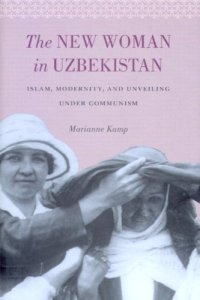
Ebook: The New Woman in Uzbekistan: Islam, Modernity, and Unveiling under Communism
Author: Marianne Kamp
- Tags: Asia, China, Hong Kong, India, Japan, Korea, Pakistan, Philippines, Russia, History, Europe, Belgium, France, Germany, Great Britain, Greenland, Italy, Netherlands, Romania, Scandinavia, History, Middle East, Bahrain, Egypt, Iran, Iraq, Israel & Palestine, Jordan, Kuwait, Lebanon, Oman, Qatar, Saudi Arabia, Syria, Turkey, United Arab Emirates, Yemen, History, Women in History, World, History, Social Sciences, Children’s Studies, Communication & Media Studies, Criminology, Customs & Traditions, Demography, Disaster Relief, Emigration & Immig
- Series: Jackson School Publications in International Studies
- Year: 2006
- Publisher: University of Washington Press
- Language: English
- pdf
Winner of the Association of Women in Slavic Studies Heldt Prize
Winner of the Central Eurasian Studies Society History and Humanities Book Award
Honorable mention for the W. Bruce Lincoln Prize Book Prize from the American Association for the Advancement of Slavic Studies (AAASS)
This groundbreaking work in women's history explores the lives of Uzbek women, in their own voices and words, before and after the Russian Revolution of 1917. Drawing upon their oral histories and writings, Marianne Kamp reexamines the Soviet Hujum, the 1927 campaign in Soviet Central Asia to encourage mass unveiling as a path to social and intellectual "liberation." This engaging examination of changing Uzbek ideas about women in the early twentieth century reveals the complexities of a volatile time: why some Uzbek women chose to unveil, why many were forcibly unveiled, why a campaign for unveiling triggered massive violence against women, and how the national memory of this pivotal event remains contested today.
Winner of the Central Eurasian Studies Society History and Humanities Book Award
Honorable mention for the W. Bruce Lincoln Prize Book Prize from the American Association for the Advancement of Slavic Studies (AAASS)
This groundbreaking work in women's history explores the lives of Uzbek women, in their own voices and words, before and after the Russian Revolution of 1917. Drawing upon their oral histories and writings, Marianne Kamp reexamines the Soviet Hujum, the 1927 campaign in Soviet Central Asia to encourage mass unveiling as a path to social and intellectual "liberation." This engaging examination of changing Uzbek ideas about women in the early twentieth century reveals the complexities of a volatile time: why some Uzbek women chose to unveil, why many were forcibly unveiled, why a campaign for unveiling triggered massive violence against women, and how the national memory of this pivotal event remains contested today.
Download the book The New Woman in Uzbekistan: Islam, Modernity, and Unveiling under Communism for free or read online
Continue reading on any device:

Last viewed books
Related books
{related-news}
Comments (0)